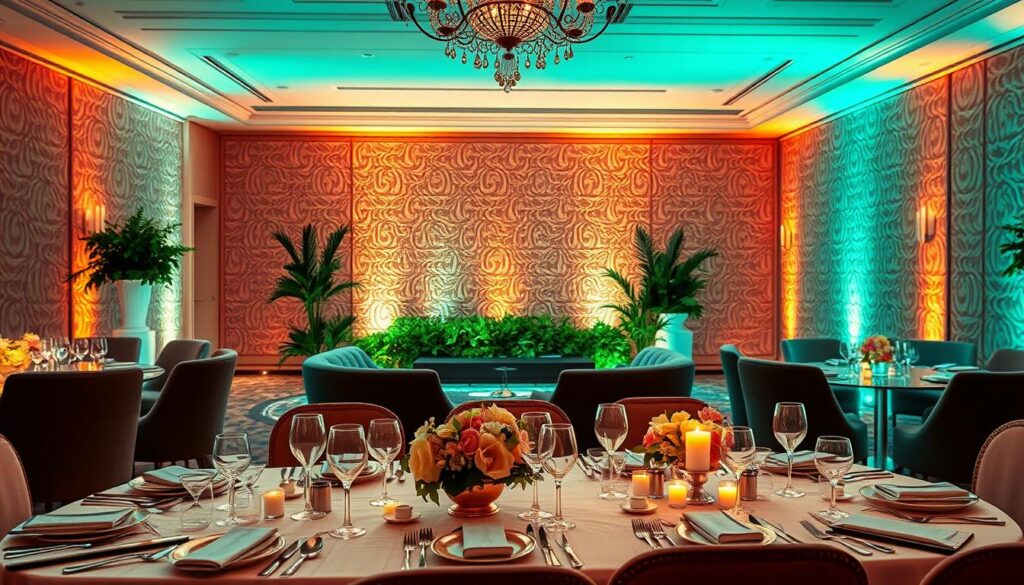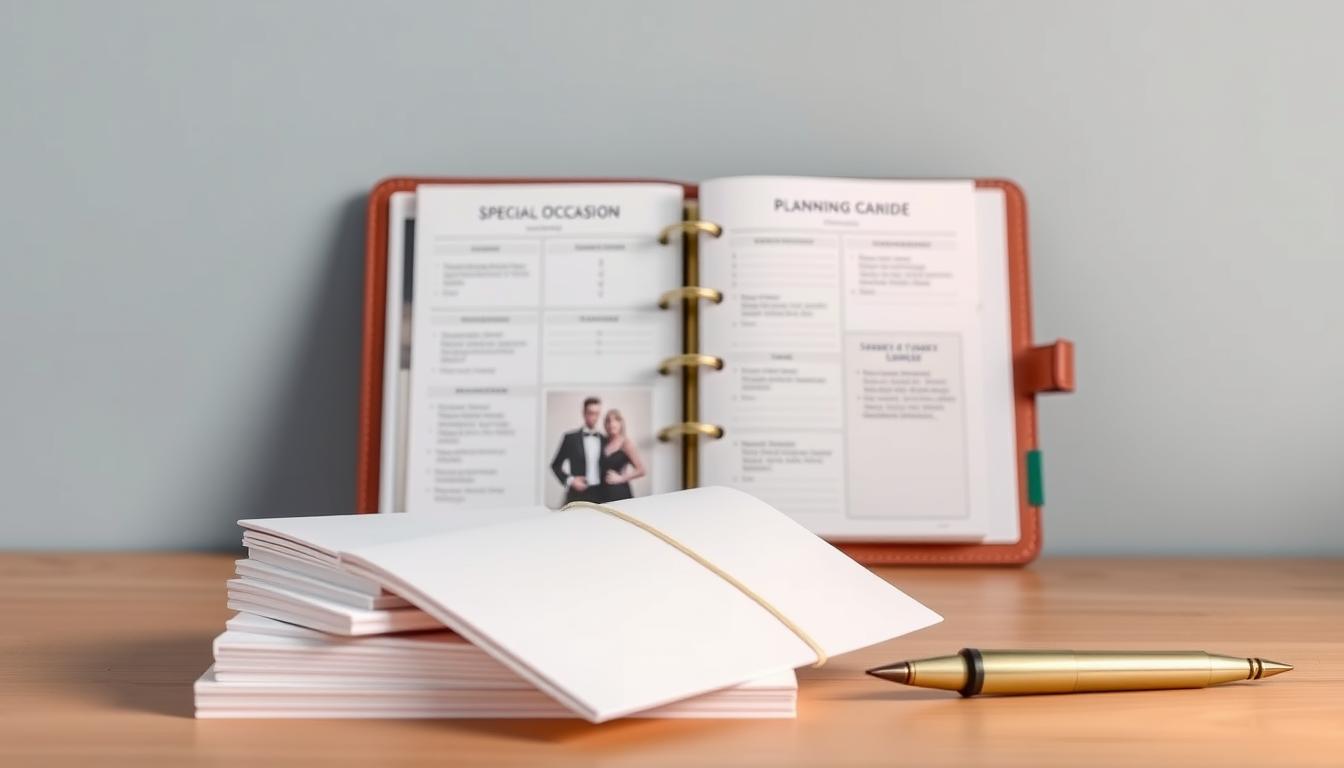Every milestone event tells a story. I remember the night my family gathered to celebrate my grandparents’ 50th wedding anniversary. The joy, laughter, and memories we made together were unforgettable.
Planning a spectacular celebration is more than just logistics. It’s about creating an unforgettable experience for everyone. Whether it’s a wedding, birthday, or corporate event, the right approach can make it extraordinary.
Your special occasion needs careful planning and thoughtful execution. This guide will help you create a memorable event that captures your unique moment. You’ll learn how to design an experience that will be cherished for years.
Planning a milestone event isn’t about perfection. It’s about creating meaningful connections. By understanding event design, you can craft an occasion that reflects your vision and brings people together in remarkable ways.
Understanding the Fundamentals of Special Occasion Planning
Planning a big event needs careful thought and planning. Every big event needs a detailed plan to make it unforgettable. Success comes from knowing the basics of event planning and building a strong base for your celebration.
Your event planning starts with clear goals and preparation. Knowing what you want helps guide your decisions during planning.
Defining Your Event Vision and Goals
Creating a clear vision means thinking deeply about your event’s purpose. Ask yourself important questions:
- What is the main goal of the event?
- Who are the main people involved?
- What feelings do you want to share?
- What special experiences will you offer?
Setting Realistic Timelines
Managing time well is key for any big event. Break your planning into smaller steps to keep things calm and ensure everything goes smoothly.
- Initial planning phase (3-6 months before)
- Detailed preparation (2-3 months before)
- Final coordination (1 month before)
- Week-of execution details
Creating a Master Checklist
A detailed checklist is your guide to success. Organize tasks by priority and deadline to keep things on track and moving forward.
Your checklist should cover important things like choosing a venue, managing the guest list, food, entertainment, and logistics. Staying organized helps turn your event vision into a great reality.
Budgeting Strategies for Your Momentous Event
Planning a memorable event needs a smart financial plan. Your special day should have a budget that’s both creative and responsible. Knowing how to use your money well can make your event truly unforgettable.
Begin with a detailed financial plan for your celebration. Divide your budget into main areas. This way, you’ll be ready for every part of the event:
- Venue rental and location costs
- Catering and refreshments
- Decorations and theme elements
- Entertainment and activities
- Miscellaneous expenses
It’s key to spend wisely on your big day. Figure out what’s most important to you and your guests. Think about what will make the most lasting memories.
Here are some ways to stretch your budget:
- Look for cheaper options
- Try to get better deals from vendors
- Plan your event during less busy times
- Take advantage of group discounts
- Save 10-15% of your budget for unexpected costs
Use digital tools and spreadsheets to keep track of your spending. Be open about your budget but stay flexible. A well-planned event doesn’t need to be expensive. It’s about investing in the moments that truly matter.
“Budgeting is not about limiting your spending, but about creating memories within your means.”
Choosing the Perfect Venue and Date
Planning a memorable event means picking the right venue and date. Your special occasion needs a place that feels just right. The perfect spot turns any event into something special.
Finding the ideal venue is a big decision. It affects the mood, guest experience, and how well the event goes.
Critical Venue Selection Criteria
- Aesthetic appeal and ambiance
- Technical infrastructure
- Location accessibility
- Parking availability
- Cost-effectiveness
Seasonal Event Planning Insights
| Season | Venue Recommendations | Potential Challenges |
|---|---|---|
| Spring | Garden venues, outdoor spaces | Potential rain disruptions |
| Summer | Beach locations, rooftop venues | High temperatures |
| Autumn | Rustic barns, vineyard settings | Unpredictable weather |
| Winter | Indoor ballrooms, ski resorts | Travel complications |
Capacity and Accessibility Considerations
Check the venue’s capacity carefully. Comfort is key – make sure there’s enough room for guests, food, and activities. Also, think about accessibility for everyone, including those with mobility issues.
“The perfect venue is where memories are crafted and moments become timeless.” – Event Planning Professionals
Your venue choice is crucial for a memorable event. Spend time researching, visiting places, and imagining your event’s potential.
Designing Your Special Occasion Experience
Creating a memorable celebration needs careful thought and planning. Your special occasion should have a unique design. This design should capture the event’s essence and delight your guests from the start.
When planning your special occasion, think about these key elements:
- Develop a cohesive theme that reflects the event’s purpose
- Create an immersive atmosphere that engages all senses
- Incorporate personal touches that make the celebration distinctive
The opening moment is crucial. It sets the tone for your celebration. It’s your guests’ first impression, a chance to create excitement and anticipation. Craft an entrance or welcome experience that immediately communicates the event’s spirit and energy.
Consider these strategic approaches to designing your momentous occasion:
- Select a color palette that evokes the right emotional response
- Choose music or ambient sounds that complement the event’s mood
- Design interactive elements that encourage guest participation
Your goal is to turn a simple gathering into an unforgettable experience. By carefully curating each detail, you’ll create a celebration that guests will remember long after it’s over.
Creating the Perfect Guest List and Invitations
Planning an important event means thinking about your guest list and invitations. Your guest list is key to a memorable event. It sets the mood for the whole celebration. Getting it right makes your special day meaningful and well-attended.
- Assess your venue’s capacity
- Consider relationship dynamics
- Balance personal and professional connections
- Set clear guest selection criteria
Managing RSVPs with Precision
Handling RSVPs well is vital for your event. Create a system to track:
- Confirmed and pending responses
- Follow up with non-respondents
- Manage last-minute changes
- Keep a guest database organized
Digital vs Traditional Invitation Options
Think about your event’s style and who’s coming. Digital invitations are quick and easy to track. Traditional paper invitations add a personal touch to your celebration.
Invitation Timeline Strategy
When to send invitations is crucial. The timing depends on your event:
- Weddings: 6-8 weeks before
- Formal galas: 4-6 weeks in advance
- Destination events: 3-4 months prior
- Casual gatherings: 2-3 weeks ahead
Pro tip: Always include clear RSVP instructions and contact information to simplify the response process.
Entertainment and Activity Planning

Planning entertainment for a big milestone needs careful thought. You must consider what your guests like. Your aim is to make the event fun and keep everyone excited.
First, know your audience. People of different ages and interests like different things. Here are some tips to make sure everyone has a good time:
- Mix structured activities with casual socializing opportunities
- Provide options for high-energy and low-key participants
- Create multi-generational engagement zones
Think about interactive experiences for your event. Interactive games, group challenges, and collaborative activities help people connect. They make the event memorable.
“The best events aren’t just about entertainment – they’re about creating shared experiences.”
Here are some entertainment types to make your event interesting:
- Physical activities (dance floors, group sports)
- Mental challenges (trivia, team competitions)
- Creative workshops
- Musical performances
- Technology-driven interactions
A great milestone event mixes planned fun with chances to socialize. Your guests should feel both engaged and at ease.
Catering and Menu Selection
Planning the perfect menu is key to a great celebration. Your catering choices can make an event unforgettable. It delights guests and creates lasting memories.
Choosing the right catering is important. You need to think about several key factors. This ensures your event meets everyone’s expectations.
Dietary Considerations: Ensuring Guest Comfort
When planning your menu, put guests’ dietary needs first. This makes your event inclusive. Here are some important tips:
- Ask about dietary needs when guests RSVP
- Include vegetarian and vegan options
- Have gluten-free and allergy-friendly dishes
- Label dishes with allergen information
Service Style Options
Your service style sets the event’s tone. Look at these popular catering styles:
| Service Style | Best For | Atmosphere |
|---|---|---|
| Buffet | Casual gatherings | Interactive, flexible |
| Plated Dinner | Formal events | Elegant, structured |
| Family-Style | Medium-sized groups | Warm, communal |
Beverage Planning Essentials
A great drink selection can make your event special. Balance is key in your drink menu:
- Calculate drink quantities
- Have both alcoholic and non-alcoholic drinks
- Consider signature cocktails
- Make sure to have water and soft drinks
“The right menu can turn a good celebration into an unforgettable experience.” – Catering Professional
By carefully choosing your catering and menu, you’ll create a memorable culinary journey. It will enhance your special occasion and impress your guests.
Decor and Theme Implementation

Turning your big day into a stunning event needs careful planning and creativity. The right decor can make any party unforgettable. It leaves a lasting memory for your guests.
First, pick a theme that shows off your event’s personality. Your decor should tell a story and make guests feel like they’re part of it.
- Choose a cohesive color palette that sets the mood
- Select decorative elements that complement your theme
- Consider lighting to enhance the overall ambiance
- Incorporate personal touches that make the event unique
When planning decor, think about looks and function. Functionality matters as much as visual impact. Make sure decorations don’t get in the way of guests moving around.
Even on a tight budget, you can create amazing decor. Here are some tips:
- Rent decorative items instead of buying
- DIY centerpieces and backdrop elements
- Use lighting to create dramatic effects
- Repurpose decorations from different areas of the venue
Your decor should add to the event, not take over. Sometimes, the smallest details make the biggest difference.
Managing Vendors and Contracts
Planning a big event means working with many vendors to make it perfect. Choosing the right people can turn a stressful time into a joyous celebration.
Handling vendor relationships is key in event planning. It needs a smart plan and clear talks.
Vendor Selection Criteria
When picking vendors, look at these important points:
- Professional experience in similar events
- Positive client testimonials and references
- Proven track record of reliability
- Alignment with your event vision
- Transparent pricing structure
Contract Negotiation Tips
Keep your event safe and your hopes high with smart negotiation:
- Request detailed written proposals
- Clarify all service expectations
- Discuss potential contingency plans
- Understand cancellation and refund policies
- Negotiate flexible payment terms
Coordination Timeline
Make a detailed plan for vendor coordination. Regular check-ins and clear documentation are key for smooth work.
Good vendor management makes event planning easy and fun.
With these tips, you’ll be ready to handle vendors well. Your special event will come to life just as you dreamed.
Day-of Execution and Timeline Management
Planning a big event needs careful day-of execution. Your event’s success depends on good timeline management and preparation. A detailed schedule helps keep things running smoothly and avoids problems.
First, make a detailed timeline for your event. Break it down into small parts, with specific times for each activity. This keeps everything organized and tells everyone what to expect.
- Develop a minute-by-minute event schedule
- Assign specific responsibilities to key team members
- Create backup plans for potential challenges
- Establish clear communication channels
Delegation is key for managing your event. Find reliable people to handle unexpected issues. This lets you enjoy the event more. Also, add some extra time to your schedule for any delays.
Flexibility is the key to turning potential challenges into seamless experiences.
Make both digital and printed versions of your timeline. Share them with important people so they know their roles and the event’s flow. Use event management apps or shared documents for updates and coordination.
- Confirm vendor arrival times
- Establish emergency contact protocols
- Have a designated point person for coordination
By using these strategies, you’ll make your event planning easy and fun. You’ll have a memorable and well-run celebration of your big milestone.
Conclusion
Planning a special occasion takes passion, creativity, and smart thinking. Your work turns ideas into lasting memories for your guests. Every detail you add makes the celebration truly yours.
A great special occasion is more than just getting things right. It’s about making connections that last. By putting thought into your planning, you make any event special. This is true for family reunions, birthdays, or work events.
Being flexible is crucial when planning your event. While planning is important, being open to changes helps you handle surprises well. Your calm and creativity will make your event feel real and fun, even with unexpected moments.
The best celebrations focus on people and shared moments, not just being perfect. By focusing on joy and connection, you create an event that touches everyone’s heart. Enjoy the planning, and your vision will come to life in a way that everyone will remember.

